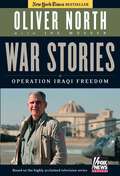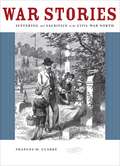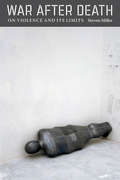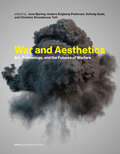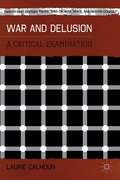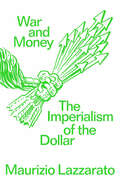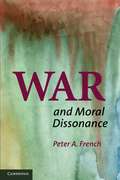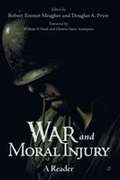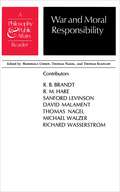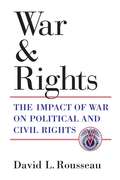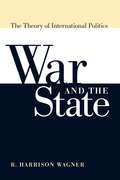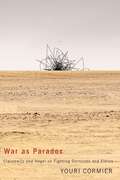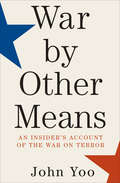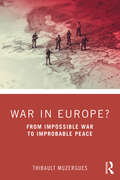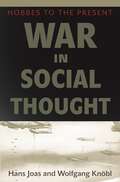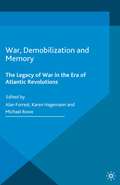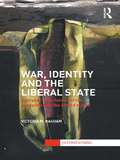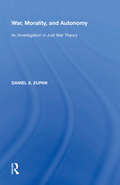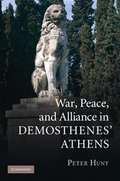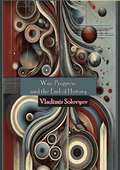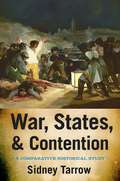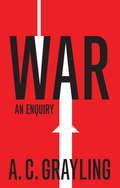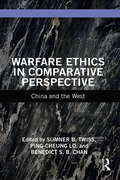- Table View
- List View
War Powers: How the Imperial Presidency Hijacked the Constitution
by Peter IronsPeter Irons is a well known political and legal historian at University of California San Diego. His latest work traces the rise of the imperial presidency and how it has trumped Congress's constitutional power of declaring war. Irons sees this as a dangerous usurption of Congress's powers, and a drift towards militarism and an unaccountable presidency.
War Stories: Operation Iraqi Freedom (War Stories Series)
by Oliver NorthThe mainstream media are trying to discredit our victory in Iraq by saying there was no reason to take out Saddam. But Oliver North knows better. He was there.<P><P> Embedded with Marine and Army units for FOX News Channel during Operation Iraqi Freedom, North (himself a decorated combat veteran) vividly tells the story his camera gave us glimpses of during the campaign to liberate Iraq. This updated edition features a new chapter detailing the events after the end of major hostilities--including the capture of Saddam Hussein--and brand-new action photos straight from the front line.
War Stories: Suffering and Sacrifice in the Civil War North
by Frances M. ClarkeThe American Civil War is often seen as the first modern war, not least because of its immense suffering. Yet unlike later conflicts, it did not produce an outpouring of disillusionment or cynicism, as most people continued to portray the war in highly sentimental and patriotic terms. While scholars typically dismiss this everyday writing as simplistic or naïve, Frances M. Clarke argues that we need to reconsider the letters, diaries, songs, and journalism penned by Union soldiers and their caregivers to fully understand the war’s impact and meaning. In War Stories, Clarke revisits the most common stories that average Northerners told in hopes of redeeming their suffering and loss—stories that enabled people to make sense of their hardship, and to express their beliefs about religion, community, and personal character. From tales of Union soldiers who died heroically to stories of tireless volunteers who exemplified the Republic’s virtues, War Stories sheds new light on this transitional moment in the history of war, emotional culture, and American civic life.
War after Death: On Violence and Its Limits
by Steven MillerWar after Death considers forms of violence that regularly occur in actual wars but do not often factor into the stories we tell about war, which revolve invariably around killing and death. Recent history demonstrates that body counts are more necessary than ever, but the fact remains that war and death is only part of the story—an essential but ultimately subordinate part. Beyond killing, there is no war without attacks upon the built environment, ecosystems, personal property, artworks, archives, and intangible traditions.Destructive as it may be, such violence is difficult to classify because it does not pose a grave threat to human lives. Nonetheless, the book argues that destruction of the nonhuman or nonliving is a constitutive dimension of all violence—especially forms of extreme violence against the living such as torture and rape; and it examines how the language and practice of war are transformed when this dimension is taken into account.Finally, War after Death offers a rethinking of psychoanalytic approaches to war and the theory of the death drive that underlies them.
War and Aesthetics: Art, Technology, and the Futures of Warfare (Prisms: Humanities and War #1)
by Jens Bjering, Anders Engberg-Pedersen, Solveig Gade, and Christine Strandmose ToftA provocative edited collection that takes an original approach toward the black box of military technology, surveillance, and AI—and reveals the aesthetic dimension of warfare.War and Aesthetics gathers leading artists, political scientists, and scholars to outline the aesthetic dimension of warfare and offer a novel perspective on its contemporary character and the construction of its potential futures. Edited by a team of four scholars, Jens Bjering, Anders Engberg-Pedersen, Solveig Gade, and Christine Strandmose Toft, this timely volume examines warfare through the lens of aesthetics, arguing that the aesthetic configurations of perception, technology, and time are central to the artistic engagement with warfare, just as they are key to military AI, weaponry, and satellite surveillance.People mostly think of war as the violent manifestation of a political rationality. But when war is viewed through the lens of aesthesis—meaning perception and sensibility—military technology becomes an applied science of sensory cognition. An outgrowth of three war seminars that took place in Copenhagen between 2018 and 2021, War and Aesthetics engages in three main areas of inquiry—the rethinking of aesthetics in the field of art and in the military sphere; the exploration of techno-aesthetics and the wider political and theoretical implications of war technology; and finally, the analysis of future temporalities that these technologies produce. The editors gather various traditions and perspectives ranging from literature to media studies to international relations, creating a unique historical and scientific approach that broadly traces the entanglement of war and aesthetics across the arts, social sciences, and humanities from ancient times to the present. As international conflict looms between superpowers, War and Aesthetics presents new and illuminating ways to think about future conflict in a world where violence is only ever a few steps away.ContributorsLouise Amoore, Ryan Bishop, Jens Bjering, James Der Derian, Anthony Downey, Anders Engberg-Pedersen, Solveig Gade, Mark B. Hansen, Caroline Holmqvist, Vivienne Jabri, Caren Kaplan, Phil Klay, Kate McLoughlin, Elaine Scarry, Christine Strandmose Toft, Joseph Vogl, Arkadi Zaides
War and Delusion
by Laurie CalhounCalhoun examines the centuries-old paradigm of just war theory to determine whether modern 'just war' rationalizations constitute sound justifications or pro-military propaganda. Her work reveals how the practice of modern war contradicts the most basic values and principles of modern Western democracies.
War and Money: The Imperialism of the Dollar
by Maurizio LazzaratoThe business of imperial conflict: Why capitalism needs war.Maurizio Lazzarato&’s War and Money explores the connections between capitalist expansion, international economic conflict, and war, via an analysis of the imperialism of the American dollar. He examines why contemporary left-wing theorists such as Michel Foucault and Antonio Negri have failed to recognize war as a fundamental aspect of capitalism. Renewed readings of Marx, Lenin, and Rosa Luxemburg argue for class struggle against capitalist war as a fundamental aspect of leftist theory.
War and Moral Dissonance
by Peter A. FrenchThis collection of essays, inspired by the author's experience teaching ethics to Marine and Navy chaplains during the Iraq War, examines the moral and psychological dilemmas posed by war. The first section deals directly with Dr Peter A. French's teaching experience and the specific challenges posed by teaching applied and theoretical ethics to men and women wrestling with the immediate and personal moral conflicts occasioned by the dissonance of their duties as military officers with their religious convictions. The following chapters grew out of philosophical discussions with these chaplains regarding specific ethical issues surrounding the Iraq War, including the nature of moral evil, forgiveness, mercy, retributive punishment, honour, torture, responsibility and just war theory. This book represents a unique viewpoint on the philosophical problems of war, illuminating the devastating toll combat experiences take on both an individual's sense of identity and a society's professed moral code.
War and Moral Injury: A Reader
by Robert Emmet Meagher Douglas A. PryerMoral Injury has been called the "signature wound" of today's wars. It is also as old as the human record of war, as evidenced in the ancient war epics of Greece, India, and the Middle East. But what exactly is Moral Injury? What are its causes and consequences? What can we do to prevent or limit its occurrence among those we send to war? And, above all, what can we do to help heal afflicted warriors? This landmark volume provides an invaluable resource for those looking for answers to these questions. Gathered here are some of the most far-ranging, authoritative, and accessible writings to date on the topic of Moral Injury. Contributors come from the fields of psychology, theology, philosophy, psychiatry, law, journalism, neuropsychiatry, classics, poetry, and, of course, the profession of arms. Their voices find common cause in informing the growing, international conversation on war and war's deepest and most enduring invisible wound. Few may want to have this myth-challenging, truth-telling conversation, but it is one we must have if we truly wish to help those we send to fight our wars.
War and Moral Responsibility: A Philosophy and Public Affairs Reader (Philosophy And Public Affairs Readers Ser.)
by Thomas Nagel Marshall Cohen Thomas ScanlonThis remarkably rich collection of articles focuses on moral questions about war. The essays, originally published in Philosophy & Public Affairs, cover a wide range of topics from several points of view by writers from the fields of political science, philosophy, and law. The discussion of war and moral responsibility falls into three general categories: problems of political and military choice, problems about the relation of an individual to the actions of his government, and more abstract ethical questions as well. The first category includes questions about the ethical and legal aspects of war crimes and the laws of war; about the source of moral restrictions on military methods or goals; and about differences in suitability of conduct which may depend on differences in the nature of the opponent. The second category includes questions about the conditions for responsibility of individual soldiers and civilian officials for war crimes, and about the proper attitude of a government toward potential conscripts who reject its military policies. The third category includes disputes between absolutist, deontological, and utilitarian ethical theories, and deals with questions about the existence of insoluble moral dilemmas.
War and Rights: The Impact of War on Political and Civil Rights
by David RousseauWarfare in Europe contributed to the development of the modern state. In response to external conflict, state leaders raised armies and defended borders. The centralization of power, the development of bureaucracies, and the integration of economies all maximized revenue to support war. But how does a persistent external threat affect the development of a strong state? The “Garrison State” hypothesis argues that states that face a severe security threat will become autocracies. Conversely, the “Extraction School,” argues that warfare indirectly promotes the development of democratic institutions. ? Execution of large-scale war requires the mobilization of resources and usually reluctant populations. In most cases, leaders must extend economic or political rights in exchange for resolving the crisis. Large-scale warfare thus expands political participation in the long run. The authors use empirical statistical modeling to show that war decreases rights in the short term, but the longer and bigger a war gets, the rights of the citizenry expand with the conflict. The authors test this argument through historical case studies—Imperial Russia, Austro-Hungarian Dual Monarchy, African Americans in World War I and II, and the Tirailleurs Senegalese in World War I—through the use of large-N statistical studies—Europe 1900–50 and Global 1893–2011—and survey data. The results identify when, where, and how war can lead to the expansion of political rights.
War and the State: The Theory of International Politics
by R. Harrison WagnerWar and the Stateexposes the invalid arguments employed in the unproductive debate about Realism among international relations scholars, as well as the common fallacy of sharply distinguishing between conflict among states and conflict within them. As R. Harrison Wagner demonstrates, any understanding of international politics must be part of a more general study of the relationship between political order and organized violence everywhere--as it was in the intellectual tradition from which modern-day Realism was derived. War and the Statedraws on the insights from Wagner's distinguished career to create an elegantly crafted essay accessible to both students and scholars. "Possibly the most important book on international relations theory since Kenneth Waltz'sTheory of International Politics. " ---James Fearon, Stanford University "This is one of the best books on international relations theory I have read in a very long time. It is required reading for any student of modern IR theory. Once again, Wagner has shown himself to be one of the clearest thinkers in the field today. " ---Robert Powell, Robson Professor of Political Science, University of California, Berkeley "Painting on a vast canvas, and tackling and integrating topics such as state formation, domestic politics, and international conflict, R. Harrison Wagner'sWar and the Stateoffers many brilliant insights into the nature of international relations and international conflict. War and the Statecompellingly highlights the importance of constructing rigorous and valid theorizing and sets a high standard for all students of international relations. The field has much to gain if scholars follow the trail blazed by Wagner in this book. " ---Hein Goemans, University of Rochester R. Harrison Wagner is Professor of Government at the University of Texas.
War as Paradox: Clausewitz and Hegel on Fighting Doctrines and Ethics
by Youri CormierTwo centuries after Carl von Clausewitz wrote On War, it lines the shelves of military colleges around the world and even showed up in an Al Qaeda hideout. Though it has shaped much of the common parlance on the subject, On War is perceived by many as a "metaphysical fog," widely known but hardly read. In War as Paradox, Youri Cormier lifts the fog on this iconic work by explaining its philosophical underpinnings. Building up a genealogy of dialectical war theory and integrating Hegel with Clausewitz as a co-founders of the method, Cormier uncovers a common logic that shaped the fighting doctrines and ethics of modern war. He explains how Hegel and Clausewitz converged on method, but nonetheless arrived at opposite ethics and military doctrines. Ultimately, Cormier seeks out the limits to dialectical war theory and explores the greater paradoxes the method reveals: can so-called "rational" theories of war hold up under the pressures of irrational propositions, such as lone-wolf attacks, the circular logic of a "war to end all wars," or the apparent folly of mutually assured destruction? Since the Second World War, commentators have described war as obsolete. War as Paradox argues that dialectical war theory may be the key to understanding why, despite this, it continues.
War as Paradox: Clausewitz and Hegel on Fighting Doctrines and Ethics (McGill-Queen's Studies in the History of Ideas #67)
by Youri CormierThe origin and continued importance of dialectical war theory in the works of Clausewitz and Hegel.
War by Other Means: An Insider's Account of the War on Terror
by John YooJohn Yoo, the key legal architect of the Bush administration’s response to 9/11, delivers a fascinating insider account of the War on Terror. While America reeled from the cataclysmic events of September 11, 2001, Yoo and a skeletal staff of the Office of Legal Counsel found themselves on the phone with the White House. In a series of memos, Yoo offered his legal opinions on the president’s authority to respond, and in the process had an almost unmatched impact on America's fight against terrorism. His analysis led to many of the Bush administration’s most controversial policies, including detention at Guantanamo Bay, coercive interrogation, military trials for terrorists, preemptive attacks, and the National Security Agency’s wiretapping program. In fascinating detail, Yoo takes us inside the corridors of power and examines specific cases, from John Walker Lindh and Jose Padilla to an American al-Qaeda leader assassinated by a CIA pilotless drone in the deserts of Yemen. In a midterm election year, when the controversies over the president’s handling of the War on Terror are sure to wage more forcefully than ever before, John Yoo’s War by Other Means is set to become one of the fall’s most talked about books.
War in Europe?: From Impossible War to Improbable Peace
by Thibault MuzerguesIn this highly provocative and documented book, Thibault Muzergues describes how war in Europe is now more likely than it has been for at least the past 30 years, how it might come back to Europe and what Europeans can do to avoid getting drawn again in fratricide conflicts. Many consider Europe a continent of peace, with NATO guaranteeing its security and the EU providing the political glue for a Europe Whole and Free. But what if this was not the case anymore? What if, after a decade of crisis, today’s Europe was much more fragile than we thought? The author challenges our assumptions about peace in Europe and forces us to face the realities of a world that has become much more dangerous. Far from being apocalyptic, this book serves as an advance warning to the dangers, both internal and external that are now closing in on Europe – and suggests solutions to avoid them. This book will be key reading for those interested in European politics and history, the European Union, security, and strategic studies, and more broadly to current affairs and international relations.
War in Social Thought: Hobbes to the Present
by Wolfgang Knöbl Hans JoasA sweeping history of social theories about war and peace, from Hobbes to the twenty-first centuryThis book, the first of its kind, provides a sweeping critical history of social theories about war and peace from Hobbes to the present. Distinguished social theorists Hans Joas and Wolfgang Knöbl present both a broad intellectual history and an original argument as they trace the development of thinking about war over more than 350 years—from the premodern era to the period of German idealism and the Scottish and French enlightenments, and then from the birth of sociology in the nineteenth century through the twentieth century. While focusing on social thought, the book draws on many disciplines, including philosophy, anthropology, and political science.Joas and Knöbl demonstrate the profound difficulties most social thinkers—including liberals, socialists, and those intellectuals who could be regarded as the first sociologists—had in coming to terms with the phenomenon of war, the most obvious form of large-scale social violence. With only a few exceptions, these thinkers, who believed deeply in social progress, were unable to account for war because they regarded it as marginal or archaic, and on the verge of disappearing. This overly optimistic picture of the modern world persisted in social theory even in the twentieth century, as most sociologists and social theorists either ignored war and violence in their theoretical work or tried to explain it away. The failure of the social sciences and especially sociology to understand war, Joas and Knöbl argue, must be seen as one of the greatest weaknesses of disciplines that claim to give a convincing diagnosis of our times.
War, Demobilization and Memory: The Legacy of War in the Era of Atlantic Revolutions (War, Culture and Society, 1750-1850)
by Alan Forrest Karen Hagemann Michael RoweThis volume examines the impact of the wars in the Atlantic world between 1770 and 1830, focusing both on the military, economic, political, social and cultural demobilization that occurred immediately at their end, and their long-term legacy and memory.
War, Identity and the Liberal State: Everyday Experiences of the Geopolitical in the Armed Forces (Interventions Ser.)
by Victoria BashamThis book critically examines the significance of gender, race and sexuality to wars waged by liberal states. Drawing on original field-research with British soldiers, it offers insights into how their everyday experiences are shaped by, and shape, a politics of gender, race and sexuality that not only underpins power relations in the military, but the geopolitics of wars waged by liberal states. Linking the politics of daily life to the international is an intervention into international relations (IR) and security studies because instead of overlooking the politics of the everyday, this book insists that it is vital to explore how geopolitical events and practices are co-constituted, reinforced and contested by it. By utilising insights from Michel Foucault, the book explores how shared and collectively mediated knowledge on gender, race and sexuality facilitates certain claims about the nature of governing in liberal states and about why and how such states wage war against ‘illiberal’ ones in pursuit of global peace and security. The book also develops post-structural work in international relations by urging scholars interested in the linguistic construction of geopolitics to consider the ways in which bodies, objects and architectures also reinforce particular ideas about war, identity and statehood.
War, Morality, and Autonomy: An Investigation in Just War Theory
by Daniel S. ZupanJust War Theory is the governing moral doctrine for all of the major democratic militaries and indeed beyond. This book is a close study of a critical component of Just War theory, the moral status of noncombatants. In this post September 11th, 2001 time of cascading unconventional or 'dirty' wars, issues of treatment of noncombatants - whether as incidental casualties during grey area operations or as prisoners swept up by preventative security measures - have resonance across national lines. Whether or not the democracies and other states pursue their national security interests within the limits of Just War reasoning and laws, or break out of these limits in prosecuting war and security measures against terrorist organizations, is one of the top security issues of the day. Zupan examines the flaws that this complex body of moral reasoning often exhibits, arguing that many of the shortcomings of Just War theory can be resolved using Kantian methodology and the theory of autonomy. According to this conception, human beings have unconditional worth which imposes moral constraints upon the actions of other human beings. From this understanding Zupan generates principles that serve as moral guidelines for the use of force which establish a presumption against harming any human being and greatly restrict the conditions under which we may justify any unintended, collateral harm that may affect those who do not intend our harm. Considering the work of moral theorists such as Onora O'Neill, T. M. Scanlon, Michael Walzer, Paul Christopher and G. E. M. Anscombe and such issues as the Doctrine of Double Effect, autonomy and supreme emergency, Zupan concludes that if we ever are justified in targeting the innocent, it will only be under very rare conditions where the innocent themselves should accept the principle that permitted their being killed.
War, Peace, And Alliance In Demosthenes' Athens
by Peter HuntEvery Athenian alliance, every declaration of war, and every peace treaty was instituted by a decision of the assembly, where citizens voted after listening to speeches that presented varied and often opposing arguments about the best course of action. The fifteen preserved assembly speeches of the mid-fourth century BC thus provide an unparalleled body of evidence for the way that Athenians thought and felt about interstate relations: to understand this body of oratory is to understand how the Athenians of that period made decisions about war and peace. This is the first book to provide a comprehensive treatment of this subject. It deploys insights from a range of fields, from anthropology to international relations theory, in order not only to describe Athenian thinking, but also to explain it. Athenian thinking turns out to have been complex, sophisticated, and surprisingly familiar both in its virtues and its flaws.
War, Progress, and the End of History
by Vladimir Sergeyevich SolovyovWar, Progress, and the End of History by Vladimir Sergeyevich Solovyov is a profound philosophical work that explores the moral, spiritual, and political dimensions of human history, offering a compelling reflection on war, progress, and humanity’s ultimate destiny. Written by one of Russia’s most influential philosophers, Solovyov’s work combines theology, ethics, and social criticism, raising questions about the meaning of history and the future of civilization.Solovyov critically examines the idea of progress, questioning whether material and technological advancements alone lead to true human flourishing. He warns that unchecked progress, detached from moral and spiritual values, risks leading humanity toward greater conflict and destruction. His reflections on war are particularly striking, as he views it not just as a political phenomenon but as a manifestation of deeper ethical and spiritual crises within human society.At the heart of the book is Solovyov’s belief in the need for moral renewal and the integration of divine truth into human affairs. He argues that history will culminate not in endless progress but in an eschatological fulfillment—a moment when divine justice and harmony are realized at the end of history. Through this vision, Solovyov offers both a critique of modern society and a hopeful outlook for the future, emphasizing the role of love, unity, and spiritual transformation in shaping a better world.War, Progress, and the End of History remains a thought-provoking work for readers interested in philosophy, theology, and political theory. Solovyov’s ideas continue to resonate in contemporary discussions on the limits of progress, the nature of conflict, and the moral direction of humanity. His blend of intellectual rigor and spiritual insight offers a timeless perspective on humanity’s struggles and aspirations in the pursuit of a just and meaningful future.
War, States, and Contention: A Comparative Historical Study
by Sidney TarrowFor the last two decades, Sidney Tarrow has explored "contentious politics"--disruptions of the settled political order caused by social movements. These disruptions range from strikes and street protests to riots and civil disobedience to revolution. In War, States, and Contention, Tarrow shows how such movements sometimes trigger, animate, and guide the course of war and how they sometimes rise during war and in war's wake to change regimes or even overthrow states. Tarrow draws on evidence from historical and contemporary cases, including revolutionary France, the United States from the Civil War to the anti-Vietnam War movement, Italy after World War I, and the United States during the decade following 9/11. In the twenty-first century, movements are becoming transnational, and globalization and internationalization are moving war beyond conflict between states. The radically new phenomenon is not that movements make war against states but that states make war against movements. Tarrow finds this an especially troublesome development in recent U.S. history. He argues that that the United States is in danger of abandoning the devotion to rights it had expanded through two centuries of struggle and that Americans are now institutionalizing as a "new normal" the abuse of rights in the name of national security. He expands this hypothesis to the global level through what he calls "the international state of emergency."
War: An Enquiry (Vices and Virtues)
by A. C. GraylingA renowned philosopher challenges long-held views on just wars, ethical conduct during war, why wars occur, how they alter people and societies, and more. For residents of the twenty-first century, a vision of a future without warfare is almost inconceivable. Though wars are terrible and destructive, they also seem unavoidable. In this original and deeply considered book, A. C. Grayling examines, tests, and challenges the concept of war. He proposes that a deeper, more accurate understanding of war may enable us to reduce its frequency, mitigate its horrors, and lessen the burden of its consequences. Grayling explores the long, tragic history of war and how warfare has changed in response to technological advances. He probes much-debated theories concerning the causes of war and considers positive changes that may result from war. How might these results be achieved without violence? In a profoundly wise conclusion, the author envisions &“just war theory&” in new moral terms, considering the lessons of World War II and the Holocaust, and laying down ethical principles for going to war and for conduct during war.&“Exceptionally incisive on war and peace…As a former professional soldier, and no stranger to conflict, I regret not having had access to [War] when it mattered.&”—Milos Stankovic, Spectator&“A brisk and sweeping survey.&”—Mark Mazower, Financial Times&“Wide-ranging, accessible, and crammed with insights. Though it does not underestimate the obstacles to peace, it is never cheaply cynical. The result is somber, yet also inspiring.'—Russell Blackford, author of The Mystery of Moral Authority
Warfare Ethics in Comparative Perspective: China and the West (War, Conflict and Ethics)
by Sumner B. Twiss Benedict S. B. Chan Ping-CheungThis volume explores East Asian intellectual traditions and their influence on contemporary discussions of the ethics of war and peace.Through cross-cultural comparison and dialogue between East and West, this work charts a new trajectory in the development of applied ethics. A sequel to the volume Chinese Just War Ethics, it expands the range of the earlier work and includes attention to Japan and other Eastern and Western traditions for contrastive reflection and engages with the full range of Chinese intellectual traditions for comparative analysis. The book scrutinizes pioneering works such as the Mengzi, the Han Feizi, and the Seven Military Classics, investigating their influence in subsequent times. It also engages with new texts and thinkers such as the Four Books of the Yellow Emperor, Zeng Guofan, Chiang Kai-shek, and Mao Zedong, along with examining recent writings of the scholars of the People’s Liberation Army. The final section of the book identifies and discusses some emerging issues in the comparative study of military ethics, just war and peace that derive from the preceding sections. The volume editors then offer some concluding remarks at the end of the book.This book will be of much interest to students of the ethics of war and peace, just war theory, military ethics, Asian studies and International Relations in general.

